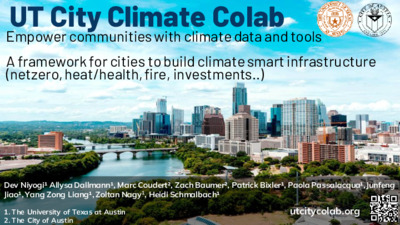4. UT City Climate Co Lab — original pdf
Backup

UT City Climate Colab Empower communities with climate data and tools A framework for cities to build climate smart infrastructure (netzero, heat/health, fire, investments..) Dev Niyogi¹ Allysa Dallmann¹, Marc Coudert², Zach Baumer², Patrick Bixler¹, Paola Passalacqua¹, Junfeng Jiao¹, Yang Zong Liang¹, Zoltan Nagy1, Heidi Schmalbach¹ 1. The University of Texas at Austin 2. The City of Austin utcitycolab.org URGENCY • Increase in the climate extremes; city needs to prepare for eventualities • Disadvantaged communities greatly challenged in "bouncing back" Infrastructure investments and response plans underway • • Students interested in place-based research • Federal grant opportunities are growing TEMPERATURE One of the “simplest” climate variables Austin changes not explains by global changes alone City scale information needs bottom up rather than top down approach only (Top down is global to local which is what we see for El Nino, La Nina effects for example) Climate Downscaling (coarse grid (100 km x 100 km ) global information statistically brought to local scale (10km or finer) – This is top down and most common way of getting climate information AUSTIN’S FUTURE CLIMATE Rain events will become more intense and less frequent Temperatures will become hotter Less frequent, but more intense cold events CIMBY CLIMATE IN MY BACKYARD There is a need to localize data climate information To complement community experience UT City Climate CoLab This creates a framework that is tied into local city departments, communities, and UT EXPERIENCE from the community, and the city UT + City Climate CoLab DATA from the climate and atmospheric sciences USEFUL TO USEABLE UT City Climate CoLab • National - NOAA NCEI • Texas has State Climate Office • Regional Climate Hubs (for agriculture) UT City Climate CoLab • City needs are unique • Data needs are localized UT City Climate CoLab • Climate models are complicated • Scenarios, Resolutions, Model Choices • Reanalysis, Data, AI/ML output UT City Climate CoLab • Localizing data and information with lived experience is important to develop local policies and investment decisions. UT Investments -Climate Program Coordinator (Allysa Dallman JSG + PT2050) - 2 postdocs (JSG; Ali and Manmeet) - LBJ 5 summer GRAs, part of Program Manager (Deidra Miniard) - Faculty time - Research Grants City Investments -CoLab Program Manager (Alexia Leclercq) - Product Developer (advertised) - ILA projects (e.g. Water Fwd; AFD) - Office of Resilience/ Sustainability - Access/Partnership Open source, Build height data sets for cities globally ( See https://texuslab.org/ ) THERMALSCAPE 2 m temperature maps across city with trees and shade consideration Tinyurl.com/ColabThermalVR HEAT MAPPING LOCAL DATA Temperature, Precipitation, Air Quality, Satellite, Transportation, and Infrastructure Academia, City, Community Partnership Austin Fire Digital Twin Lewis, R.H., Jiao, J., Seong, K., Farahi, A., Navrátil, P., Casebeer, N. and Niyogi, D., 2024. Fire and smoke digital twin–A computational framework for modeling fire incident outcomes. Computers, Environment and Urban Systems, 110, p.102093. Gratefully acknowledge AFD Justice Jones+Braniff Davis & OoR Marc Coudert ADDITIONAL PROJECTS EXTREME WEATHER ACADEMY POLICY BRIEF WORKSHOP DECISION MAKING CALENDAR ADVANCED DIGITAL TWINS and many more… Many potential topics to focus on ● White Roads/pavement impacts on neighborhood (Public Works) ● Building energy and carbon estimation for future climate (e.g. Passive Building Pilot) ● Seasonal Outlooks ● Extreme Weather Academy (LBJ + JSG+ PT2050) ● Impact of trees (and where to plant trees for heat mitigation, carbon sequestration) ● Graduate Theses Example of Graduate Thesis Human Heat Health Index (H3I) Google satellite Land temperature Air temperature H3I Heat vulnerability H3I = SoVI × max UTCIi − 32 , 0 × Ei Ref: H3I, Kamath, 2023 𝑡𝑖𝑚𝑒= i 23 Heat exposure google map walk app for Austin (under development) 24 How to optimize urban tress for heat mitigation? (Part-1) Only public spaces considered in 1-mile buffer Step 1: Identify potential locations 25 How to optimize urban tress for heat mitigation? (Part-2) Step 2: Calculate UTCI 26 How to optimize where to place 250 new trees for heat mitigation? (Part-3) Step 3: Optimize tree planting locations for n trees (n= 250) Step 4: Recalculate UTCI and estimate the heat stress reduced 27 How to optimize urban tress for heat mitigation? (Part-4) Within 2-mile buffer Step 5: Try with different number of trees 28 Austin open public spaces About 18,000 trees optimized Available public space New tree locations CityTFT: Temporal Fusion Transformer for Urban Building Energy Modeling, TY Dai, D Niyogi, Z Nagy Dai, T.Y., Dilsiz, A.D., Niyogi, D. and Nagy, Z., 2023, November. A Comparison of Different Deep Learning Model Architectures and Training Str ategy for Urban Energy Modeling. In Proceedings of the 10th ACM International Conference on Systems for Energy -Efficient Buildings, Cities, and Transportation(pp. 316-317). UTwin: A digital twin of the UT Austin campus, BuildSys23 Calvin Lin, TYDai, AD Dilsiz, D Crawley, D Niyogi, Z Nagy Ask... Prioritize Climate CoLab projects? Sustained Support/ Development? (“projects need X+ Y”) 4 yearly City Climate Assessments? ”Independent” climate brief/ policy / technology vetting? utcitycolab.org 1 2 3 4 Supplemental Slides ADDITIONAL PROJECTS EXTREME WEATHER ACADEMY POLICY BRIEF WORKSHOP DECISION MAKING CALENDAR ADVANCED DIGITAL TWINS and many more… KEY TAKEAWAYS 2 3 1 There is a need to bring together 3 elements ● Academia ● City Departments ● Community We want to make climate data from useful to useable, and work with what the cities and communities need (more localized data) Co Production and continuation of collaborations is necessary and essential ACKNOWLEDGEMENTS The efforts and support of City of Austin and University of Texas at Austin leadership, the Community groups including the COmmunity Grant from US Congressman Doggett is greatly appreciated. The work also benefits from NASA IDS, DOE Urban Integrated Field Lab, NSF CISE and AGS, and NOAA NIHHIS. Framework for IPCC City Climate Assessment Special Report. CONTACT Allysa Dallmann dallmann@utexas.edu Dev Niyogi dev.niyogi @jsg.utexas.edu utcitycolab.org